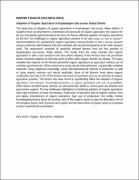| dc.description.abstract | BWOWE FRANCIS (2010-M152-20015)
Adoption of Organic Agriculture in Kyalulangira Sub-county, Rakai District
The study was on adoption of organic agriculture in Kyalulangira sub-county, Rakai district. It sought to find out what farmers understood and perceived of organic agriculture; the reasons for the use of synthetic agrochemicals in the area; the factors affecting adoption of organic agriculture by farmers; the challenges to organic agriculture practice in the sub-county as well as farmers‟ recommendations for popularising organic agriculture among farmers It was a survey research using a researcher-administered interview schedule with structured questions as the main research tools. The respondents consisted of randomly selected farmers from the five parishes of Kyalulangira sub-county, Rakai district. The results from the study indicate that organic agriculture is still a new concept in the area which majority of the farmers have not yet known and/or embraced despite the fact that some of them were organic farmers by default. The study revealed that majority of the farmers perceived organic agriculture as agriculture without use of synthetic agrochemicals. Others viewed it as using natural materials/inputs, using locally available materials, using indigenous knowledge, using cultural/traditional methods of production as well as using organic manures and natural pesticides. None of the farmers knew about organic certification and only 5.4% of the farmers had heard of a premium price as an incentive to organic agriculture practice. The factors that were found to significantly affect the adoption of organic agriculture were farmers‟ knowledge/awareness of organic agriculture and cost of production. Other factors included labour demand, its yield potential, ability to control pests and diseases and government support. The key challenges highlighted as hindering adoption of organic agriculture were high incidences of pests and diseases, small scale of operation, lack of organic markets, time and labour intensiveness of organic operations, high cost of production, low yields, limited knowledge/awareness about the practice, lack of fine organic inputs to play the alternative role of the inorganic inputs, lack of government support and the slow action of organic inputs as compared to their conventional counterparts.
Key words: Organic, Agriculture, Adoption | en_US |


